Evaluating Country Programmes - OECD Online Bookshop
Evaluating Country Programmes - OECD Online Bookshop
Evaluating Country Programmes - OECD Online Bookshop
You also want an ePaper? Increase the reach of your titles
YUMPU automatically turns print PDFs into web optimized ePapers that Google loves.
<strong>OECD</strong> 1999<br />
<strong>Country</strong> Programme Evaluation: Synthesis Report from the Workshop<br />
A donor’s reasons for carrying out CPEs may also change over time to reflect<br />
changes in agency-wide interest and policy:<br />
– The second set of CPEs carried out by the Netherlands differed from the first,<br />
in that more attention was paid to the broader context of bilateral relationships;<br />
there was specific focus on the Dutch priority themes of the environment<br />
and women; and the dynamics of the programme during the period<br />
under review were explored in more detail.<br />
– The approach adopted by the Swiss Agency for Development and Cooperation<br />
(SDC) to the evaluation of aid to Tanzania has changed over time.<br />
An initial self-evaluation exercise had the advantage of being more intimately<br />
embedded in country programme practice: it was faster and contributed<br />
to learning and the formulation of the new country programme. A<br />
subsequent external evaluation was more participatory and provided<br />
accountability. SDC concludes that the best insights are obtained by a combination<br />
of self-evaluation and external evaluation (SDC, 1999b: 7): this combination<br />
helped to build capacity, solidarity and commitment among<br />
programme staff and partners, with the result that the findings were more<br />
readily “owned” and incorporated by the programme. It was however timeconsuming<br />
and relatively expensive.<br />
It should be noted that differences in rationale can also be seen even within<br />
the course of a single CPE (when donor headquarters, country programme actors<br />
and evaluators may have different expectations of the process and outcome).<br />
Sometimes the differences between the CPEs conducted by a single donor<br />
reflect the particular needs of particular country programmes rather than a secular<br />
change in donor evaluation policy. The case for a CPE is most compelling and the<br />
process of <strong>Country</strong> Programme Evaluation easiest if i) the country programme has<br />
well-defined goals and strategy; ii) the elements of this country programme are<br />
coherent; and iii) the country programme represents a major part of the donor’s global<br />
operations and/or of total aid flows to the partner country in question. The case<br />
is less self-evident and the process harder if the country programme is in reality little<br />
more than a collection of diverse projects which answer directly to the donor<br />
headquarters rather than to a country programme office. 4<br />
This led some participants to argue that evaluation, at least in conventional<br />
logical framework terms, is extremely difficult if there are not clear (country) programme<br />
goals against which to evaluate performance. <strong>Country</strong> Programme Evaluation<br />
is undoubtedly harder when there is not a coherent country programme, when<br />
the goals of the country programme are implicit rather than explicit (as in the case<br />
of EU aid to Russia), or when the evaluation will assess aid on criteria that differ<br />
from those conceived in the original design. There is a convincing argument however<br />
that, while difficult, <strong>Country</strong> Programme Evaluation can still take place and can<br />
15


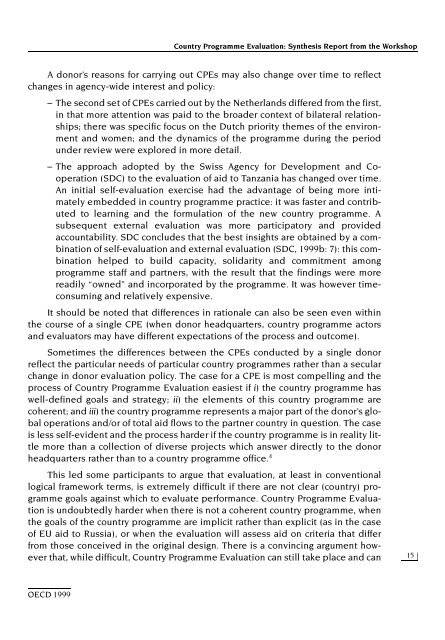



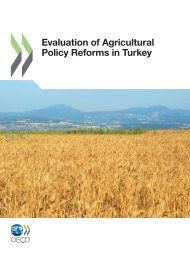
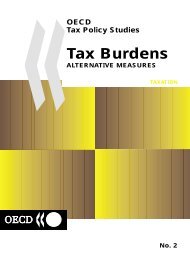
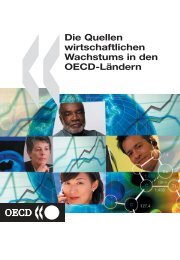
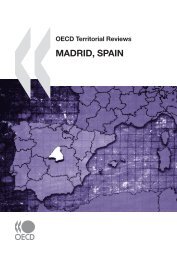



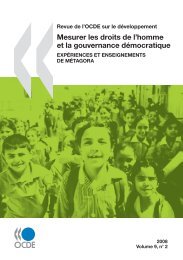
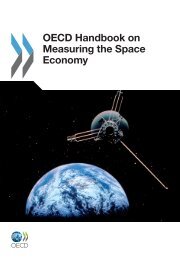
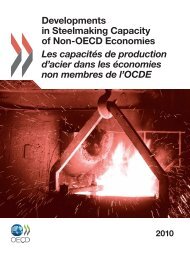
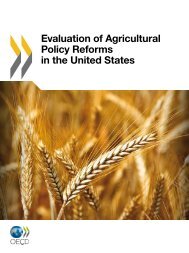
![CQE=U]^\]Z: KAZAKHSTAN - OECD Online Bookshop](https://img.yumpu.com/3915768/1/190x253/cqeuz-kazakhstan-oecd-online-bookshop.jpg?quality=85)